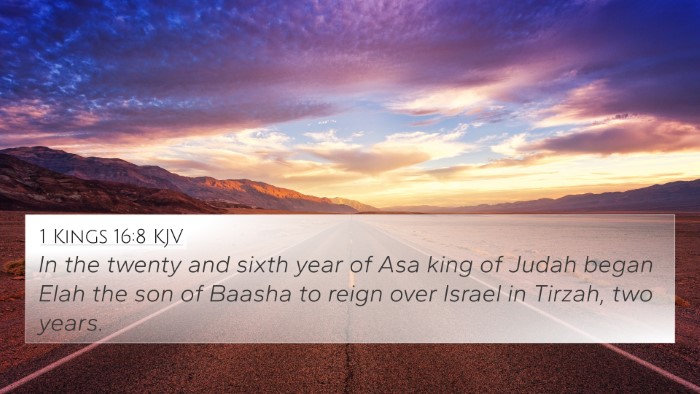Understanding 1 Kings 15:33
Bible Verse: 1 Kings 15:33 - "In the third year of Asa king of Judah began Baasha the son of Ahijah to reign over all Israel in Tirzah, and reigned twenty and four years."
Introduction to the Verse
This verse introduces a significant transition in the history of Israel's monarchy during the divided kingdom period. Baasha's rise to power serves as a reminder of the political turmoil and spiritual decline that characterized Israelite history. It is essential to interpret this verse in conjunction with other scripture to understand its implications fully.
Commentary Insights
-
Matthew Henry's Commentary:
Henry highlights Baasha's reign as a fulfillment of God's judgment against Jeroboam's house, emphasizing the importance of divine sovereignty in governance. His reign represents a continuation of the sinful practices established by Jeroboam, thus encapsulating the moral decay present in Israel.
-
Albert Barnes' Notes:
Barnes comments on the political landscape, explaining how Baasha's ascension is notable for its violent inroads into the stability created by prior rulers. His reign is marked by conflict, indicating a cycle of sin and retribution present in the Israelite narrative.
-
Adam Clarke's Commentary:
Clarke adds depth by comparing Baasha to Asa, noting the contrasting fidelity to God between these two kings. He suggests that understanding this relationship is crucial to grasp the broader lessons within Kings regarding loyalty and apostasy.
Biblical Context
This verse requires an understanding of the context surrounding the divided kingdom. As Israel’s history unfolds, we see the impact of leadership on the nation's spiritual and social fabric.
Bible Verse Cross-References
To enrich the understanding of 1 Kings 15:33, it is helpful to consider the following cross-references:
- 1 Kings 14:10 - God's judgment against Jeroboam.
- 1 Kings 12:16-20 - The division of the kingdom.
- 2 Chronicles 16:1-10 - Asa's reign examined in relation to Baasha.
- 1 Kings 16:1-5 - The prophecy regarding Baasha, further exploring his legacy.
- Romans 13:1 - The principle of divine appointment of rulers.
- 2 Kings 9:1-6 - God's judgment against the lineage of Baasha.
- 1 Samuel 8:7-9 - The people's desire for a king and God's warning.
Connecting Themes
The narrative embedded in 1 Kings speaks to broader themes within the Bible:
- Divine Sovereignty: God's ultimate ruling authority over the affairs of man.
- Simplicity of Sin: The ease with which leaders and people can descend into disobedience.
- Consequences of Leadership: How the actions of kings lead to national consequences.
Comparative Bible Verse Analysis
Through comparative analysis, we can observe how Baasha's reign reflects themes mentioned in both the Old and New Testaments. Here are some insights:
- Judgment: Both Baasha's reign and the rulers of Judah faced consequences for their actions, paralleling New Testament teachings about accountability (Matthew 12:36).
- The Struggle for Power: The violent power dynamics described in 1 Kings echo in the leadership controversies of the early church (Acts 15:1-29).
Tools for Bible Cross-Referencing
For those wanting to delve further into this theme, using tools for Bible cross-referencing can enrich one's study experience:
- Bible Concordance: A helpful guide for finding specific words and their biblical placements.
- Bible Cross-Reference Guide: Systems that map the relationships between different scriptures.
- Cross-Reference Bible Study: Techniques to deepen one’s understanding through thematic connections.
Conclusion
In summary, 1 Kings 15:33 serves as a key verse for understanding the history of Israel and the consequences of leadership. Through insights from various commentaries and cross-references, one can see the intricate tapestry of themes woven throughout the biblical narrative. This verse, while specific to its historical context, speaks to the ongoing relevance of obedience, leadership, and divine authority in the lives of believers today.



